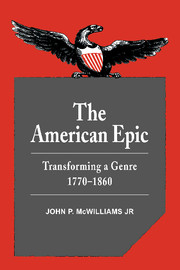5 - Red Achilles, Red Satan
Published online by Cambridge University Press: 22 March 2010
Summary
By 1815 Americans open to new ideas of heroic behavior and epic form confronted perplexing literary crosscurrents offering great opportunity. Clara Reeve, Robert Southey, and Walter Scott had led them to entertain the possibility, heretical to any student of Dryden's Aeneid and Pope's Iliad, that the medieval romance and the classical epos were not only similar, but could be mixed to their mutual benefit. Epic poets might now be conceived, not as moralistic penmen, but as aged wandering minstrels singing heroic lays about a departed civilization. Scott's four narrative poems had provided the model for a new, still unnamed kind of heroic verse – part adventure romance, part heroic lay, part medieval pageantry – written in a short metrical line and free of the conventions associated with blank verse and heroic couplet. Should such a poem be considered an epic? Should one even worry about its classification, as long as it might prove a literary medium more suitable to the New World?
After another decade, two even more heretical possibilities were to emerge. In the face of centuries of authority, America's great heroic work should perhaps be written in the once low but presently popular genre of prose fiction. And perhaps America's heroic subject was not, as Barlow, Bryan, and Paulding had believed, the conquering of the American savage by civilization, but the demise of those noble red peoples who, alone in all of American history, had embodied the qualities of the heroic age.
- Type
- Chapter
- Information
- The American EpicTransforming a Genre, 1770–1860, pp. 123 - 157Publisher: Cambridge University PressPrint publication year: 1989
- 1
- Cited by



